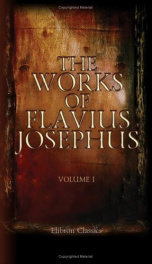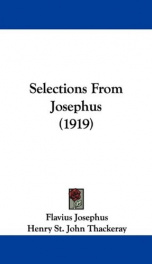Josephus Flavius

William Whiston (9 December 1667 – 22 August 1752), was an English theologian, historian, and mathematician. He is probably best known for his translation of the Antiquities of the Jews and other works by Josephus, his A New Theory of the Earth, and his Arianism. Whiston was born to Josiah Whiston and Katherine Rosse at Norton-juxta-Twycross, in Leicestershire, of which village his father was rector. He was educated privately, partly on account of the delicacy of his health, and partly that he might act as amanuensis to his father, who had lost his sight. He studied at Queen Elizabeth Grammar School, Tamworth. After his father's death, he entered at Clare College, Cambridge as a sizar on June 30, 1686, where he applied himself to mathematical study, where he was awarded the degree of Bachelor of Arts (B.A.) (1690), and M.A. (1693), and was elected Fellow in 1691 and probationary senior Fellow in 1693.[1] William Lloyd ordained Whiston at Lichfield in 1693. In 1694, claiming ill health, he resigned his tutorship at Clare to Richard Laughton, chaplain to John Moore (1646-1714), the bishop of Norwich, and swapped positions with him. He now divided his time between Norwich, Cambridge and London. In 1698 Bishop More awarded him the living of Lowestoft where he became Rector. In 1699 he resigned his Fellowship of Clare College and left in order to marry Ruth, daughter of George Antrobus, Whiston's headmaster at Tamworth school. His A New Theory of the Earth from its Original to the Consummation of All Things (1696), an articulation of creationism and flood geology which held that the global flood of Noah had been caused by a comet, obtained the praise of both Newton and Locke, the latter of whom classed the author among those who, if not adding much to our knowledge, "At least bring some new things to our thoughts." He was an early advocate, along with Edmond Halley, of the periodicity of comets; he also held that comets were responsible for past catastrophes in earth's history. In 1701 he resigned his Rectorship to become Isaac Newton's substitute as Lucasian lecturer at Cambridge, whom he succeeded in 1702. Here he engaged in joint research with his junior colleague Roger Cotes, appointed with Whiston's patronage to the Plumian professorship in 1706. In 1707 he was Boyle lecturer. For several years Whiston continued to write and preach both on mathematical and theological subjects with considerable success; but his study of the Apostolic Constitutions had convinced him that Arianism was the creed of the early church. For Whiston, to form an opinion and to publish it were things almost simultaneous. His heterodoxy soon became notorious, and in 1710 he was deprived of his professorship and expelled from the university after a well-publicized hearing. The rest of his life was spent in incessant controversy — theological, mathematical, chronological, and miscellaneous. Because of his Arianism, Whiston was never invited to be a member of the Royal Society, due probably to Newton's feelings about him after he published his unorthodox views. Whiston was permitted, however, to lecture to the Society frequently. He vindicated his estimate of the Apostolical Constitutions and the Arian views he had derived from them in his Primitive Christianity Revived (5 vols., 1711-1712). In 1713 he produced a reformed liturgy, and soon afterwards founded a society for promoting primitive Christianity, lecturing in support of his theories in halls and coffee-houses at London, Bath, and Royal Tunbridge Wells. In 1714, Whiston was instrumental in the establishment of the Board of Longitude and for the next forty years made persevering efforts to solve the longitude problem. He gave courses of demonstration lectures on astronomical and physical phenomena and engaged in many religious controversies. Whiston produced one of the first isoclinic maps of southern England in 1719 and 1721. One of the most valuable of his books, the Life of Samuel Clarke, appeared in 1730. While considered heretical on many points, he was a firm believer in supernatural Christianity, and frequently took the field in defense of prophecy and miracle, including anointing the sick and touching for the king's evil. His dislike of rationalism in religion also made him one of the numerous opponents of Benjamin Hoadly's Plain Account of the Nature and End of the Sacrament. He held that Song of Solomon was apocryphal and that the Book of Baruch was not. He was fervent in his views of ecclesiastical government and discipline, derived from the Apostolical Constitutions, on the ecclesiastical authorities. He challenged the teachings of Athanasius. He challenged Sir Isaac Newton's Biblical chronological system with success; but he himself lost not only time but money in an endeavour to solve the problem of longitude. In 1736 he caused widespread anxiety among London's citizen when he predicted the world would end on October 16 of that year because a comet would hit the earth; the Archbishop of Canterbury, William Wake, had to officially deny this prediction to ease the public. Of all his singular opinions the best known is his advocacy of clerical monogamy, immortalized in The Vicar of Wakefield. Of all his labours the most useful is his translation of the works of Josephus (1737), with notes and dissertations, still often reprinted to the present day. His last "famous discovery, or rather revival of Dr Giles Fletcher, the Elder's," which he mentions in his autobiography with infinite complacency, was the identification of the Tatars with the lost tribes of Israel. In 1745 he published his Primitive New Testament. About the same time (1747) he finally left the Anglican communion for the Baptist, leaving the church literally as well as figuratively by quitting it as the clergyman began to read the Athanasian Creed. He had a happy family life and died in Lyndon Hall, Rutland, at the home of his son-in-law, Samuel Barker on 22 August 1752. He was survived by his children Sarah, William, George, and John. Whiston left a memoir (3 vols., 1749-1750) which deserves more attention than it has received, both for its characteristic individuality and as a storehouse of curious anecdotes and illustrations of the religious and moral tendencies of the age. It does not, however, contain any account of the proceedings taken against him at Cambridge for his antitrinitarianism, these having been published separately at the time. This article incorporates text from the Encyclopædia Britannica, Eleventh Edition, a publication now in the public domain. Isaac Barrow (1664) · Isaac Newton (1669) · William Whiston (1702) · Nicholas Saunderson (1711) · John Colson (1739) · Edward Waring (1760) · Isaac Milner (1798) · Robert Woodhouse (1820) · Thomas Turton (1822) · George Biddell Airy (1826) · Charles Babbage (1828) · Joshua King (1839) · George Stokes (1849) · Joseph Larmor (1903) · Paul Dirac (1932) · James Lighthill (1969) · Stephen Hawking (1979) · Michael Green (2009)
do you like this author?
What readers are saying
What do you think? Write your own comment on this book!
write a commentWhat readers are saying
What do you think? Write your own comment on this author!
write a commentBook list

the works of flavius josephus volume 1
Series:
Unknown
Year:
Unknown
Raiting:
3.5/5
This Elibron Classics book is a facsimile reprint of a 1888 edition by J. B. Lippincott Company, Philadelphia.
Show more
add to favoritesadd In favorites
Book list

the works of flavius josephus volume 1
Series:
Unknown
Year:
Unknown
Raiting:
3.5/5
This Elibron Classics book is a facsimile reprint of a 1888 edition by J. B. Lippincott Company, Philadelphia.
Show more
add to favoritesadd In favorites

the jewish war of flavius josephus with his autobiography
Series:
Unknown
Year:
Unknown
Raiting:
5/5
Show more
add to favoritesadd In favorites

the history of the siege and destruction of jerusalem
Series:
Unknown
Year:
Unknown
Raiting:
4.5/5
Show more
add to favoritesadd In favorites

the genuine works of flavius josephus the jewish historian containing the twen
Series:
Unknown
Year:
Unknown
Raiting:
4/5
Show more
add to favoritesadd In favorites

the genuine works of flavius josephus the learned and authentic jewish histori
Series:
Unknown
Year:
Unknown
Raiting:
4.5/5
Show more
add to favoritesadd In favorites

our young folks josephus the antiquities of the jews and the jewish wars of fl
Series:
Unknown
Year:
Unknown
Raiting:
4.5/5
Show more
add to favoritesadd In favorites

complete works of josephus antiquities of the jews the wars of the jews agains
Series:
Unknown
Year:
Unknown
Raiting:
4.5/5
Show more
add to favoritesadd In favorites

The Wars of the Jews; or the history of the destruction of Jerusalem
Series:
Unknown
Year:
Unknown
Raiting:
2.5/5
From Preface: "1. 1 Whereas the war which the Jews made with the Romans hath been the greatest of all those, not only that have been in our times, but, in a manner, of those that ever were heard of; both of those wherein cities have fought against cities, or nations against nations; while some men who were not concerned in the affairs themselves have gotten together vain and contradictory stories by hearsay, and have written them down after a sophistical manner; and while those that were there present have given false accounts of things, and this either out of a humor of flattery to the Romans, or of hatred towards the Jews; and while their writings contain sometimes accusations, and sometimes encomiums, but no where the accurate truth of the facts; I have proposed to myself, for the sake of such as live under the government of the Romans, to translate those books into the Greek tongue, which I formerly composed in the language of our country, and sent to the Upper Barbarians; 2 Joseph, the son of Matthias, by birth a Hebrew, a priest also, and one who at first fought against the Romans myself, and was forced to be present at what was done afterwards, [am the author of this work]. 2. Now at the time when this great concussion of affairs happened, the affairs of the Romans were themselves in great disorder. Those Jews also who were for innovations, then arose when the times were disturbed; they were also in a flourishing condition for strength and riches, insomuch that the affairs of the East were then exceeding tumultuous, while some hoped for gain, and others were afraid of loss in such troubles; for the Jews hoped that all of their nation which were beyond Euphrates would have raised an insurrection together with them. The Gauls also, in the neighborhood of the Romans, were in motion, and the Geltin were not quiet; but all was in disorder after the death of Nero. And the opportunity now offered induced many to aim at the royal power; and the soldiery affected change, out of the hopes of getting money. I thought it therefore an absurd thing to see the truth falsified in affairs of such great consequence, and to take no notice of it; but to suffer those Greeks and Romans that were not in the wars to be ignorant of these things, and to read either flatteries or fictions, while the Parthians, and the Babylonians, and the remotest Arabians, and those of our nation beyond Euphrates, with the Adiabeni, by my means, knew accurately both whence the war begun, what miseries it brought upon us, and after what manner it ended. 3. It is true, these writers have the confidence to call their accounts histories; wherein yet they seem to me to fail of their own purpose, as well as to relate nothing that is sound. For they have a mind to demonstrate the greatness of the Romans, while they still diminish and lessen the actions of the Jews, as not discerning how it cannot be that those must appear to be great who have only conquered those that were little. Nor are they ashamed to overlook the length of the war, the multitude of the Roman forces who so greatly suffered in it, or the might of the commanders, whose great labors about Jerusalem will be deemed inglorious, if what they achieved be reckoned but a small matter."
Show more
add to favoritesadd In favorites

The Project Gutenberg Works Of Flavius Josephus
Series:
Unknown
Year:
Unknown
Raiting:
3.5/5
Show more
add to favoritesadd In favorites

Josephus' Discourse to the Greeks Concerning Hades
Series:
Unknown
Year:
Unknown
Raiting:
1/5
This book was converted from its physical edition to the digital format by a community of volunteers. You may find it for free on the web. Purchase of the Kindle edition includes wireless delivery.
Show more
add to favoritesadd In favorites
What readers are saying
What do you think? Write your own comment on this author!
write a commentGenre
- Books
- Literature & Fiction / Literary
- Books / Children's Books / History & Historical Fiction
- Nonfiction / Politics / General
- Literature & Fiction / Classics
- Cooking, Food & Wine
- Religion & Spirituality / Christianity / Reference / Commentaries / Old Testament
- Books / Jews / History / 586 B.C.-70 A.D
if you like Josephus Flavius try:
readers also enjoyed
What readers are saying
What do you think? Write your own comment on this author!
write a commentGenre
- Books
- Literature & Fiction / Literary
- Books / Children's Books / History & Historical Fiction
- Nonfiction / Politics / General
- Literature & Fiction / Classics
- Cooking, Food & Wine
- Religion & Spirituality / Christianity / Reference / Commentaries / Old Testament
- Books / Jews / History / 586 B.C.-70 A.D
if you like Josephus Flavius try:
readers also enjoyed
Do you want to exchange books? It’s EASY!
Get registered and find other users who want to give their favourite books to good hands!


